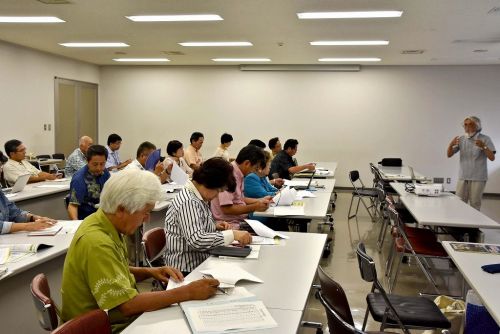Opposition to Henoko Soil Hauling advises extending scope of invasive species prevention

On July 13 in the Prefectural Assembly building in Naha City, Ichiro Yuasa (right) speaks zealously as assembly members listen and take notes.
July 13, 2017 Ryukyu Shimpo
On July 13, the nationwide liaison council Opposition to Henoko Soil Hauling held a study meeting from the point of view of environmental conservation at the Okinawa Prefectural Assembly building in Naha City, where about 15 people were in attendance.
Advisor Ichiro Yuasa, who lectured at the meeting, spoke about land reclamation work that the Japanese government is pushing forward in Henoko, Nago City, for the construction of a replacement facility to Futenma Air Station. He pointed that this action not only goes against the National Biodiversity Strategy of Japan, it also disturbs this ecosystem peculiar to Okinawa. In addition, he addressed the importance of effectively utilizing the prefectural regulations on preventing introduction of invasive species through land reclamation materials (or soil regulations) in order to strengthen the check system through wide-area coordinated efforts with the municipal governments in places where soil is being collected.
Yuasa cited the example of brown widow spiders, a known invasive species, being found in the soil hauled from Amami Oshima for Naha Airport’s second runway construction project. This was the first situation to which the soil regulations applied, and threw the regulations’ efficacy into question. He voiced his opinion that to set a precedent for contingencies, the prefectural government should conduct thorough examinations on the introduction of the invasive species, and put a check system in place following extermination operations.
Furthermore, Yuasa shared his hope that assembly members would understand the threat posed by invasive species, improve the efficacy of soil regulations, and if possible promote regional biodiversity strategies through establishing a liaison council with municipalities in other prefectures.
Co-representative Etsuko Abe of Opposition to Henoko Soil Hauling pointed out that the Japanese government, which should be striving for environmental conservation in accordance with the National Biodiversity Strategy, is acting inconsistently with its own strategy by pressing forward with conduct that is environmentally destructive. She said that the environmentally destructive conduct related to military base construction does not only affect Okinawa, but extends to the soil collection sites around the Inland Sea.
Opposition to Henoko Soil Hauling is affiliated with 18 organizations that are making efforts focused in the Inland Sea region.
(English translation by T&CT and Erin Jones)
Previous Article:New Henoko base construction may destroy area’s coral reef
Next Article:Joseph Kamiya wants to carry the future of the Okinawa Association of America
[Similar Articles]
- Representatives from soil source sites for land reclamation assert solidarity with Okinawa opposing Henoko construction
- Nationwide liaison council opposing Henoko soil hauling calls for measures against invasive species
- Construction of new base in Henoko constrained by prefectural ordinance concerning soil
- Editorial: The Government of Japan should abide by IUCN advisement regarding Henoko
- Group opposing Henoko Soil Hauling discusses future activities
 Webcam(Kokusai Street)
Webcam(Kokusai Street)


